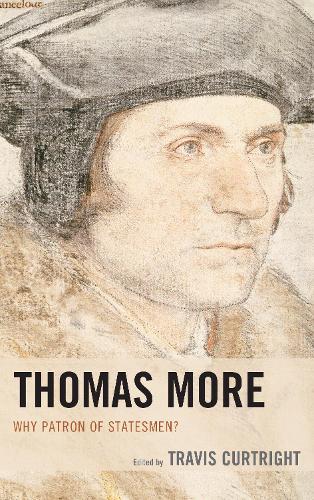
Thomas More: Why Patron of Statesmen
(Paperback)
Available Formats
Publishing Details
Thomas More: Why Patron of Statesmen
By (Author) Travis Curtright
Bloomsbury Publishing PLC
Lexington Books
24th July 2017
United States
Classifications
Professional and Scholarly
Non Fiction
Politics and government
Civics and citizenship
320.092
Physical Properties
Paperback
244
Width 151mm, Height 228mm, Spine 17mm
354g
Description
The year 2015 marks the 15th anniversary of St. Pope John Paul IIs promulgation of Thomas More as Patron Saint of Statesmen and Politicians. Yet during these years no serious answer has been given by a community of scholars as to why More was named such. What were Mores guiding principles of leadership and in what ways might they remain applicable This collection of essays addresses these questions by investigating More through his writings, his political actions, and in recent artistic depictions.
Reviews
I appreciate the strengths of a fine volume that will benefit many different audiences. . . .The volume's illumination of More's life, writings, and historical reception deserves the attention of all scholars and teachers--Catholic and non-Catholic alike. . . .The book successfully addresses these many audiences by having a wide variety of fine essays. * Fellowship of Catholic Scholars Quarterly *
In 2000 Pope John Paul II proclaimed St. Thomas More to be the patron of statesmen and people in public life. And yet scholarly investigations of Mores principles of statesmanship are still relatively few. In commissioning and editing this often stimulating collection of essays, Travis Curtwright seeks to fill the gap. He and his fellow contributors, several connected to the Center for Thomas More Studies at the University of Dallas, aim to revive interest in More by distilling from his writings and life experiences the very essence of this subtle, steely individual who began as a commercial lawyer and moral philosopher and ended up as Henry VIIIs only honest councilor. It is an approach that in the wrong hands could become clumsily instrumentalist and teleological. Fortunately, these contributors know the pitfalls and largely avoid them. By writing Utopia, More created an entirely new literary genre, one that has continued to rekindle the perennially central issues of social and political thinking ever since. And for that, his statesmanship should be honored. * The Journal Of Religion *
This excellent book dives deep into the mystery of Thomas More (1478-1535), lawyer, scholar, saint. It was published to commemorate Pope John Pauls naming More the Patron of Statesmen, and examines, in particular, the grounds for that honorific. The authors included in this volume read like a whos who of More scholarship. Their carefully crafted essays are worthy of close study and will repay the efforts of serious students as well as interested amateurs. The essays are variously focused but, taken as a whole, admirably comprehensive in exploring the words and deeds of their famous subject. What follows is but one reflection born of this magisterial work. * Interpretation *
One of the contributors to this book has written that admiration draws the soul toward an example of human excellence; it is felt as a desire to be like the person admired. This remarkable collection of essays offers a convincing and multifaceted view of Thomas More as the ideal Christian statesman. Through the study of both Mores writings and two famous works of fiction, A Man for All Seasons and Wolf Hall, this scholarly enterprise gives flesh to the gubernator in Thomas More, and validates his election as Patron of Statesmen. -- Marie-Claire Phelippeau, Editor of Moreana
Author Bio
Travis Curtright is associate professor of humanities at Ave Maria University.
